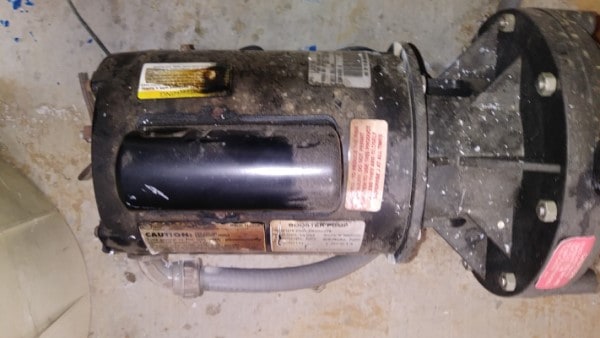A loud swimming pool motor is a common complaint, but when it suddenly gets really loud and then shortly thereafter shuts off most homeowners start envisioning a pickpocket waiting for them by their pool pump getting ready to rob them blind. It can be somewhat frightening when the pool motor gets REALLY loud. In most cases the repair is fairly minimal, but here I will cover some of the more common causes and remedies to this issue.
So how do you know if it’s going to be an easy cheap fix, vs. an expensive more difficult fix. Would you believe me if I said you could tell just by the sound? Yeah, I know that sounds a little crazy, but I have actually diagnosed this issue over the phone. It’s a pretty useful trick to have in your back pocket, especially if you’re a pool pro that has to drive out to do a repair. If you’re not there yet, don’t worry, I’ll run down some checks you can do to narrow down the cause of the issue.
So, what exactly causes a swimming pool pump motor to buzz or hum and then shut off?
The cause of a pool pump motor buzzing or humming and the shutting off can be narrowed down to three basic causes. 1) a jammed or blocked impeller, 2) incorrect incoming voltage, or 3) a bad or failing start capacitor.
Each of these causes is different, but when you understand the mechanics of the pool pump, you will quickly understand how they are each related. Here I will run down each of the issues and how to address them. The order of the inspections is in order of easy to hard, although none of the fixes is overly difficult with a little basic know-how and tools.
A Jammed or Blocked Impeller
If the impeller is blocked or loaded up in the pump, it can stop spinning. If your pool is missing a skimmer basket, pump basket, or main drain cover, this should be a suspected. Baskets and covers are meant to protect the pump from large debris getting into the impeller. When debris is allowed to build up inside the impeller it will eventually jam.
If you have an impeller jam the best case scenario is that it builds up quickly and seizes the pump before it can heat up the pump. I say this is best-case because then all the parts should be salvageable. Here we are going to assume that is the case.
To inspect for a jammed impeller make sure the power to the pump is off at the breaker, and ensure no one can turn it on. I usually throw a padlock on the breaker box after turning off the breaker. Next you will need to remove the pump lid and basket. Now reach down into the bottom of the pump and see of you can spin the motor with your fingers. If you have a larger hand or fingers you may need to use a small screwdriver. If the impeller spins freely, good news, it’s not jammed and you can likely move to the next section.
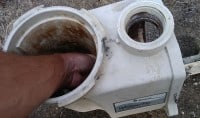
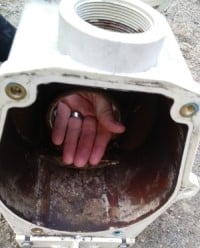
If the impeller spins, but kind of gritty then you are likely looking at failing motor bearings. The sound that this would create is usually a higher pitched whining until enough heat is created to trip the thermal protection on the motor and shut it off. So usually this won’t cause a hum or buzzing sound until the bearing completely fails and locks up the motor. So, moving on…
SOLUTION: If you find the impeller to be full of debris you will need to access it by separating the pump ‘wet end’ from the motor. Depending on the model you are dealing with will dictate how this is done. Some models like the Pentair Whisperflo or Intelliflo will have 6 bolts to remove. Other models like the Challenger, or Sta-rite Dyna Glas have a tension ring that is removed and the whole thing will separate. Once you have access to the impeller, simply remove the debris from all the veins and then reassemble the pump in the reverse order of taking it apart.
Bad Capacitors Cause Pool Pump Motors to Buzz Loudly
Another common problem that cause loud buzzing is a failed or failing capacitor.
Single speed pool motors are what is called “capacitor start” motors. Basically, the capacitor stores energy that is quickly released when the motor is initialized. The capacitor temporarily “kick-starts” the motor by releasing the higher energy stores and giving the motor the torque needed to get up to speed quickly. It’s kind of like being in 1st gear in your car. Once up to speed, an internal switch deactivates the capacitor.
If the capacitor has failed the pump will not start turning because the motor’s internal parts, the impeller, and the water in the pump add too much resistance to allow the motor to turn with just the incoming source voltage. So instead of turning the motor the activated motor just sits there and buzzes and slowly overheats. Once the internal thermal protection reaches a specified temperature it will deactivate the motor to cool it down.
This failure is commonly misdiagnosed by swimming pool service companies. The way I see it, for two reasons. 1) they don’t bother learning this aspect of pool pump repair, or 2) there’s better money in replacing the entire motor or pump so they tell customers the pump is bad. Most pool service clients trust the company they hired so they just go with it.
Solution: To test the capacitor you will need a multimeter that can test capacitance or micro farads. Depending on the manufacturer of the motor the capacitor will either be mounted to the top of the motor under a cover or mounted in the back where all the wired connections are.
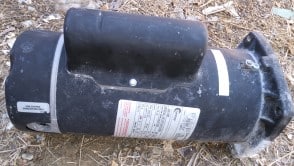
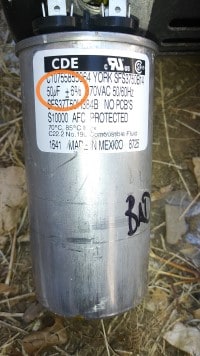
The capacitor looks like a miniature soda can with 2 wires connected to it, either silver or black. Turn off power to the pump. Take a metal screwdriver (HOLDING THE PLASTIC HANDLE) touch the metal screwdriver across the two metal terminals of the capacitor to de-energize it. Disconnect the two wires so the capacitor is not connected to anything. Check the capacitance rating stamped on the side. Set your multimeter to test microfarads (you may need to look at your instruction manual) and then touch one probe to each terminal of the capacitor. If the capacitor is good the multimeter will read the same as the rating stamped on the capacitor, or pretty close. If the capacitor is bad, it is a very simple and cheap replacement cost.
Wrong Voltage Will Cause A Pump Motor to Buzz
A less common cause to a buzzing pump motor is incorrect incoming voltage.
The reason this is less common is because the incoming voltage generally doesn’t change once the pump is installed and running. It does happen though, so it’s important to cover it. The symptoms are pretty similar to a bad capacitor. The reason it happens can be anything from frayed wires caused by rodents, wires come loose, breaker going bad. Because there are a number of reasons this happens it’s just good practice to test voltage before going any further.
Solution: Like the solution to the capacitor issue this will require you to have a multimeter. You will need to be testing a live circuit so be very careful and take all safety precautions possible. On most pool pumps you can remove the access panel to the connections on the motor. Turn the pump on so it buzzes and test the voltage at the terminals. The tested voltage should be within 10% of the rated voltage for the pump. Many pumps these days have dual voltage motors, meaning they can be wired to single or two-phase circuits, so you’ll need to confirm both the required voltage and the source voltage. For these pumps there will be an indicator for the required voltage that is easy to find and read. If the voltage is bad at the connections, you will need to go upstream to find the break in voltage. It could be in a junction box, at the breaker or anywhere in between.
Wrong voltage isn’t a common issue, but when it is an issue it’s a tough one to track down. I recommend if you aren’t competent with electrical troubleshooting, now would be a time to hire a pro…sorry DIYers, I know that’s not what you want to hear.
Other Pool Pump Motor Problems
It really doesn’t make sense to drill down into every little issue that could cause a problem with your pool pump motor. I mentioned earlier that bad bearings can cause the motor to seize up. Anything that requires the motor to be completely disassembled to be fixed is ultimately not worth the effort in my opinion. By the time you pick up parts and disassemble everything and get it back together you will likely have spent good money after bad. Most of these pump motors begin to fail after about 10-15 years of service. The average cost of a new motor is currently about $200, so in most cases if the repair is going to take you down a deep rabbit hole, you are better calling the motor a loss and replacing it.
Still $200 is pretty cost-effective compared to a new complete pump at $1000 – $2500 installed.
Check out the next article to see where pool algae come from and how to manage it.
Recent Posts
The Origin of Green Algae in Swimming Pools: Unveiling the Culprit
Swimming pools are synonymous with relaxation, fun, and refreshing dips during hot summer days. However, the appearance of green algae can turn this enjoyable experience into a frustrating one. Green...
At the heart of every pool is a filter pump that needs to be run every day for a specified length of time. Rather than try to remember to turn a pool pump on and off every day, pool builders and...


